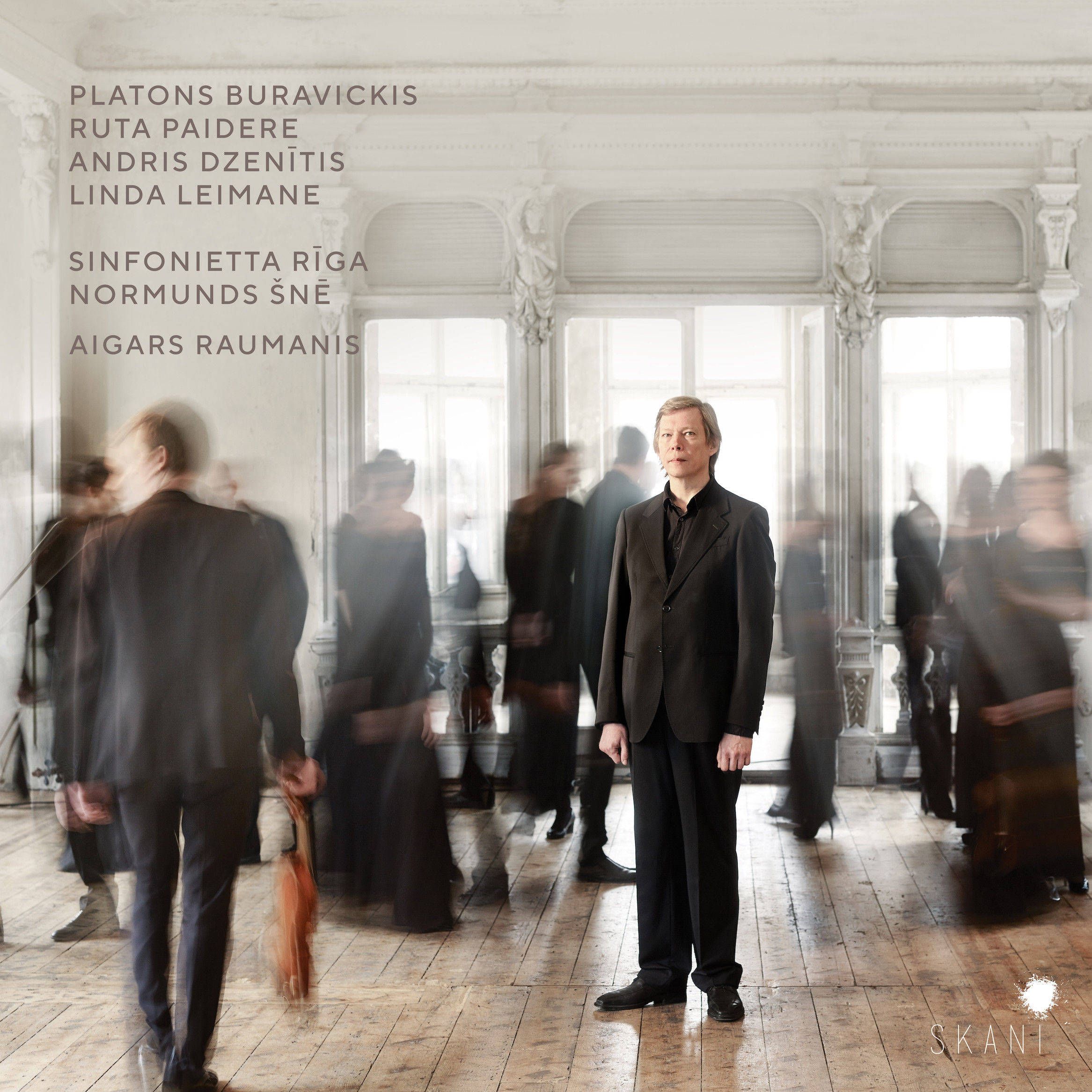The Sinfonietta Rīga chamber orchestra has been led by conductor and artistic director Normunds Šnē since the ensemble was founded in 2006. One of the goals of the ensemble is to promote new orchestral compositions by Latvian composers, and they have worked with dozens of Latvian composers throughout their decade and a half of performance.
A recent example is a collection of works by composers Andris Dzenītis, Platons Buravickis, Linda Leimane, and Ruta Paidere, released at the end of 2021. The disparate and eclectic compositions reveal the depth and variety of modern Latvian academic music.
Andris Dzenītis, a composer in his mid 40s, has, in his many decades of composition, already created a large and diverse body of work. His contribution to this collection is the comparatively brief (six minute) Euphoria, an overture for chamber orchestra. Though a shorter work, it presents a concentrated and distilled example of Dzenītis’ musical vision. The work is meant as a tribute to the late composer Pēteris Plakidis, whose orchestral works also had expansive, dramatic elements. Euphoria begins in a celebratory mood, but then quickly dissolves into an uncertain, tense atmosphere – perhaps this is meant as Dzenītis presenting both the actual euphoria, as well as the many after-effects of euphoric feelings.
Platons Buravickis, still in his early thirties, has already established himself with his compositions, at times experimental, at times romantic, his works encompass a broad range – from intimate chamber music pieces to large scale orchestral works. This collection presents his Concerto for Saxophone Plastmases temperatūra (Temperature of Plastics) featuring saxophonist Aigars Raumanis. The work has an environmental theme – it could be interpreted as a warning to humanity about pollution. Accordingly, the work has an ominous, foreboding tone – punctuated by Raumanis’ saxophone performance. Raumanis has both flighty, delicate solo phrases (perhaps representing birds?) which alternate with interactions with the harsh, crashing percussion of the orchestra. There is barely any respite from the harshness throughout the work, even to the very end, when the work crescendos into what sounds like an alarm, then ends suddenly.
Composer Linda Leimane’s works are full of emotion and drama, such as Ray-Bows, included on this collection. Neither the CD booklet nor the composer’s website offers much in the way of programmatic notes (save for the score, which says ‘Brutally, hearts of iron’) so it is entirely up to the listener to interpret the work for themselves. The work is filled with dramatic tension, and is in a near constant state of motion, with frequent rising arpeggios, perhaps suggesting flight.
Hamburg-based Latvian composer Ruta Paidere’s work Tempera is a contrast to the other works on this collection – Paidere’s composition is calmer, quieter, with a kind of meandering quality. Paidere builds textures using the sounds of the orchestra, layering one on top of another, occasionally harmonious, but occasionally discordant. There is a sense of unease throughout the work, as small changes in tone have an unsettling effect, a sense of unsteadiness. The work has a long, gradual crescendo before quietly dissipating at the conclusion.
Sinfonietta Rīga and conductor Normunds Šnē reveal the many layers and textures of these four works. Technically difficult (requiring a skillful orchestra, such as Sinfonietta Rīga), deep, dramatic – these compositions by Andris Dzenītis, Platons Buravickis, Linda Leimane, and Ruta Paidere display both a broad spectrum of sounds and emotions, as well as compositional skill and creativity.
Egils Kaljo
www.latviansonline.com 19/12/2022
___________________________________________________
Sinfonietta Riga is a relatively young ensemble, founded in Latvia in 2006. On this disc from the Latvian label Skani, Sinfonietta Riga and conductor Normunds Šnē perform four works written for the ensemble by Latvian composers, Ruta Paidere’s Tempera, Andris Dzenītis' Euphoria, Platons Buravickis' The Temperature of Plastics with saxophonist Aigars Raumanis and Linda Leimane’s Ray-Bows.
For much of the 20th and 21st centuries, music in the Baltic countries has remained intimately intertwined with the complexities of history. The composers represented on this disc are amongst the generations that grew up able to work freely, without persecution by totalitarian regimes or clashes with even older political ideologies. In fact, two of the composers on the disc were born around the time that Latvia regained its independence. Not that musical life was all sweetness and light. Political ideology in the newly independent Latvia saw the profession of composer as almost completely superfluous and unnecessary, official rhetoric, said the country already had one composer – as well as one famous pianist, one award-winning violinist, and so on – so it did not need any more. For this reason, many of the composers from these early generations found themselves needing to live and work elsewhere.
All four pieces on the disc are a world away from the minimalism and spirituality embraced by Latvian composers such as Rihards Dubra. All four works here celebrate a sort of maximalism and a joy in complexity of texture and rhythm, along with technical challenge.
The disc begins with a work by Andris Dzenītis (born 1978). His Euphoria, is an overture for chamber orchestra written in 2017 in honour of the teacher and composer Pēteris Plakidis (1947-2017). It is a six minute work full of rhythm and energy, colour and movement with a sense of constant motion and multiple moving parts.
Platons Buravickis' concerto The Temperature of Plastics was written for saxophonist Aigars Raumanis and represents a challenge both to performer and listener. The solo part uses a number of extended techniques in the instrument, as well as being a challenge to stamina as well. There is an uncompromising element to Buravickis' music here, and an anger. The title of the concerto seems to refer to the ongoing challenge of environmental pollution, but Buravickis' response is anything but New Age. From the very beginning the orchestral writing is full of colour, movement and energy with multilayered writing ensuring that there is a great deal going on. The spiky writing for the soloist only goes to emphasize the sense of anger, and the work rises at the end to a profoundly intense climax. This piece, at over 20 minutes long, is a terrific tour de force.
Linda Leimane's Ray-Bows seems to have been written at the same time as Leimane was composer-in-residence with the Latvian National Symphony Orchestra. It begins with fast, mobile layers of music, lots of colours creating a sense of dramatic narrative with some truly vivid moments. Again, this is an orchestral tour de force.
Ruth Paidere's Tempera takes a very different approach, yet is in its way no less complex. Written for string orchestra, the work at first seems placidly sustained, but Paidere's use of constantly shifting microtones brings an eerie sense of textures in constant, uneasy flux.

